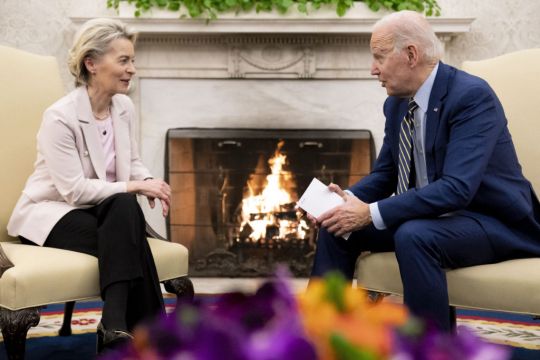US President Joe Biden and European Commission President Ursula von der Leyen have agreed to open negotiations on the use of European minerals critical in the production of batteries for electric vehicles that are eligible for US tax credits, in a potential boost for EVs.
The two sides agreed to start talks on easing differences between the US and European Union over electric vehicle tax credits included in Mr Biden’s roughly 375 billion US dollar clean energy law that passed last year.
The legislation includes incentives for the purchase of vehicles — if they are largely manufactured in the United States.

After her meeting with Mr Biden, Ms von der Leyen said if the deal is completed it will lead to critical raw materials sourced in the European Union being treated as if they were sourced in the United States.
“It is important on both sides of the Atlantic to know what kind of incentives are being given to the clean tech industry, to make sure that we join forces to boost the clean tech industry,” she said.
“That is crucial and paramount for reaching a circular economy, a net zero economy.”
Mr Biden at the start of the meeting said it was important that both sides are “driving new investments to create clean energy industries and jobs and make sure we have supply chains available” for both continents.

Mr Biden and Ms von der Leyen also used their Oval Office meeting to discuss Western coordination to support Ukraine in the war against Russia, joint efforts to decrease Europe’s dependence on Russian fossil fuels and the Biden administration’s concerns about some of China’s economic practices.
White House officials said they plan to consult members of Congress, labour groups and others with a stake in the outcome as they negotiate on EV materials with the European Commission.
Ms von der Leyen and other European leaders have voiced opposition to incentives in the Inflation Reduction Act that Mr Biden signed in August that favour American-made electric vehicles.

The legislation stipulates that for US consumers to be eligible for a tax credit of up to 7,500 dollars (£6,232) on their EV purchase, the EV’s battery must largely contain minerals from the US or a country with which the US has a free-trade agreement.
Additionally, 50% of components in batteries must be manufactured or assembled in North America by 2024, with that percentage rising gradually to 100% by 2028.
The European Commission, in part, responded by launching its own Green Deal Industrial Plan last month. The measure is expected to make it much easier to push through subsidies for green industries and to pool EU-wide projects.







